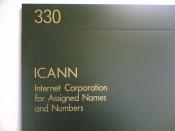Question 9.
I will answer this question first by briefly explaining the DNS structure and the present way in which it is being regulated. I will then outline the defects of the current system and then analyse some of the propositions that have been put forward in academic circles.
A domain name is simply an alphabetic representation of an IP address, which consists of a series of numbers. A domain name is more 'memorable' then an IP address and so is a more expedient means of allocating web pages. At present control over the creation and allocation of domain names is in the hands of a 'private non-profit US organisation'; the International Corporation for Assigned Names and Numbers (hereinafter ICANN). ICANN has control over top-level domain (TLD's) such as .gov, .edu etc and this controls spans throughout the globe because ICANN also exerts its influence over ccTLD's (country code top level domains).
National entities such as the Hong Kong Domain Name Registration Company Limited and Nominet in the UK have responsibility for the registration and assignment of the .hk and .uk domain names respectively. However, these entities are not autonomous, instead each of these bodies regulates their domain names according to the contractual stipulations dictated by ICANN.
The reason why ICANN has such immense control over the Internet is simply because the US controls the A root server as well 8/12 of the secondary root servers. As Hagen aptly puts it, "such control forms the basis for a US claim tantamount to ownership of the entire domain space." However, at present a consensus is growing to have the powers of control diverted away from ICANN to a more international body. For example the European Commission fears that the current US Green paper proposals could "further consolidate...


